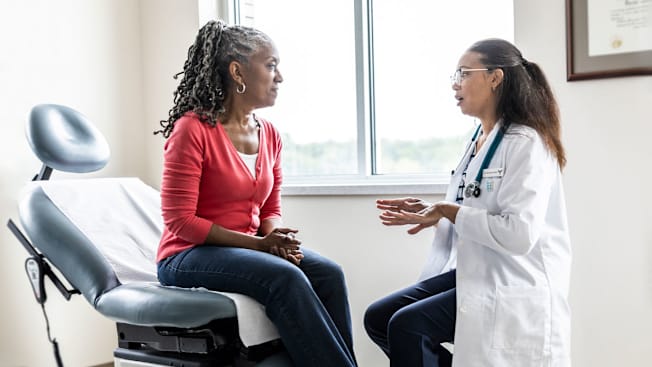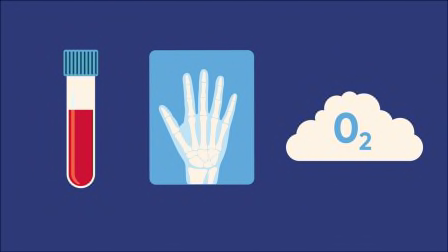Health Screenings You Need Now
Colonoscopy? Bone density scan? Which tests are a must, and which you can skip.

Health screenings, like those for colorectal cancer, can uncover issues at an early stage—when they may be more treatable.
But as we get older, it’s not always clear which tests are still essential. "Many of the professional guidelines don’t even address older adults," says Mara Schonberg, MD, MPH, a geriatrician and associate professor of medicine at Harvard Medical School in Boston.
Colorectal Cancer Screening
The gold standard screening is colonoscopy, where a doctor looks at the inside of your colon with a small camera that’s inserted internally. It’s typically done every 10 years between ages 45 and 75 (but more often if your doctor finds potentially cancerous polyps). There’s also flexible sigmoidoscopy, which examines only the lower part of your colon; it’s done every five years. In addition, there are stool tests that should be done every one to three years. If these find issues, you’ll still need a colonoscopy.
What to know: Whichever method you and your doctor decide on, the U.S. Preventive Services Task Force (USPSTF, an independent panel of disease prevention experts) and the American Cancer Society (ACS) recommend that you screen for colorectal cancer until age 75. Between 76 and 85, talk with your doctor about whether to continue, based on your overall health and screening history. "If you’re over age 75 and healthy, the benefits of colorectal screening outweigh its risks," says Andrew Chan, MD, MPH, a gastroenterologist at Massachusetts General Hospital and Harvard Medical School. A 2021 study he co-authored in JAMA Oncology found that the likelihood of dying from colorectal cancer was more than a third lower in people over 75 who’d had a colonoscopy or a sigmoidoscopy than it was in those who didn’t have these tests. Screening generally isn’t recommended after age 85; talk with your doctor about your needs.
Bone Density Scan
A bone density, or DEXA, scan is a low-dose X-ray that measures your bone strength and checks for osteopenia (low bone density) or osteoporosis.
What to know: The USPSTF recommends all women 65 or older have a baseline scan, and ongoing follow-ups as needed—like repeat testing within two years if the test finds osteoporosis. The Task Force doesn’t routinely recommend the scan for men, but groups like the Bone Health Osteoporosis Foundation and the American College of Physicians (ACP) advise that men ages 70 and older have one. Robert Adler, MD, chief of endocrinology and metabolism at the Richmond Veterans Affairs Medical Center in Virginia, recommends that most men have a baseline scan around 80, and that those with risk factors such as a past fracture do this earlier.
Mammogram
Doctors use these X-rays of the breast to look for early signs of breast cancer.
What to know: For older women at normal risk, the USPSTF and ACP recommend getting a mammogram every two years from age 50 until 74—and then stopping. The ACS advises that women do this annually at age 45 and every two years after 55, but says they can do it annually if they prefer. Breast cancer is "one of the leading causes of death in women over the age of 75," says Robert Smith, PhD, a cancer epidemiologist and senior vice president of Early Cancer Detection Science for the ACS. But there are nuances: In a 2023 study, roughly half of women in that age group whose breast cancers were found with the test were "overdiagnosed"—their cancers were so slow-growing that they didn’t end up causing problems in their lifetime. So it’s key to go over your health with your doctor when deciding, and to get a second opinion if you’re diagnosed with breast cancer.
PSA Testing
This blood test measures the amount of prostate-specific antigen protein; high levels may suggest prostate cancer.
What to know: The USPSTF and the American Urological Association recommend shared decision-making—where you discuss pros and cons with your doctor—until age 69. There’s less agreement after that. In men with less than a 10-to-15-year life expectancy, the downsides of continuing PSA screenings likely outweigh possible benefits, says Stephen Persell, MD, MPH, director of the Center for Primary Care Innovation at the Feinberg School of Medicine at Northwestern University in Chicago: "There’s a greater risk of overtreatment—treating a cancer that may never cause illness in a person’s lifetime —in older men, which can cause unpleasant side effects like bladder, bowel, and sexual function problems."
Pap Test
Here, doctors take a sample of your cervical cells to check for abnormalities that may lead to cancer.
What to know: The USPSTF, ACS, and the American College of Obstetricians and Gynecologists advise a Pap test every three years, or a Pap plus a human papillomavirus test or an HPV-only test (the ACS’ preferred option) every five years, until age 65 for those with a cervix. After that, the groups advise stopping if you’ve had a decade of negative screening results. But it’s wise to continue for up to a decade if you’re not up to date with these screenings by age 65, says Smith. A 2023 study found that nearly 1 in 5 new cervical cancers are in women ages 65 and older. These women also had more advanced cancers, and higher death rates, than younger women.
At Your Annual Physical Exam
The doctor will assess your cognition, fall risk, mood, cholesterol, and blood pressure (see "3 Blood Testing Basics," below). Based on your health, they may also give you some or all of these blood tests, says Cleveland Clinic geriatrician Kenneth Koncilja, MD.
• Vitamin D. This should be checked if you have osteopenia or osteoporosis. Low D is linked to higher fracture risk.
• Vitamin B12. About 20 percent of adults over 60 are B12-deficient. Low B12 is more likely in some, like vegetarians.
• Liver and kidney. "If you’re on any medications, we like to check liver and kidney function yearly," says Koncilja.
• Thyroid hormones. This should be checked if you have thyroid disease symptoms, like memory loss, weight gain, constipation, sleepiness, or dry skin, says Koncilja.
Note: Past or current smokers may need a yearly lung cancer scan. Get your ears and eyes checked as advised. Men 65 to 75 should have one ultrasound for abdominal aneurysm.
Blood Testing Basics
• Cholesterol. If you take a statin, get your cholesterol checked at least annually, says Nieca Goldberg, MD. The National Institutes of Health advises this for everyone over 65. But if your total cholesterol is under 200 mg/dL, you may not need it. After 65, levels don’t change much unless you’ve had a big change in diet or weight, says geriatrician Schonberg.
• Blood glucose. The USPSTF says nondiabetic overweight adults should have their blood glucose tested every three years until age 70. The American Diabetes Association says the same but has no upper age limit. If you’re in your 70s and still being tested, ask your doctor whether you really need it.
• Blood pressure. Get it checked annually, says the USPSTF (or more often if yours is elevated).




